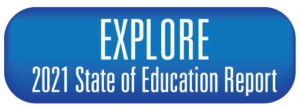The State of Education Report Shows Key Educational Outcomes Trending in Wrong Direction, Available on Interactive Platform
February 4, 2021On Wednesday, the Detroit Regional Chamber released its 2021 State of Education report, which offered a sober assessment of overall educational attainment in the region with many key indicators such as postsecondary readiness and enrollment, adult degree completion, and equity graduation gaps trending in the wrong direction.
The full report is available on a digital interactive storyboard platform allowing users to navigate the data and charts as well as learn about the Chamber’s programming to improve educational outcomes.
Chamber CEO: COVID-19 Making Our Education Work Harder, More Important Than Ever
Chamber President and CEO Sandy K. Baruah delivered a warning Wednesday during the virtual State of Education event.
“The crises of 2020 made improving postsecondary education attainment that much harder, but all the more important,” said Baruah. “Talent is the defining issue for business in the 21st century, and key to our region’s prosperity. The multiple crises our society continues to face lays bare how disparities in educational attainment have exponentially increased the challenge to our community and individuals. We have a long way to go.”
During his presentation, Baruah outlined how the Chamber has one the most robust education and talent portfolios in the region focusing on increasing access to education, ensuring success throughout the education process, and growing the talent base.
The strategy is led by the CEO Talent Council, which is chaired by Kelly’s Peter Quigley. The Chamber’s Detroit Drives Degrees program shapes the strategy, which is then executed by programs such as the Detroit Promise, Detroit Reconnect, and Let’s Detroit. The work is supported from a policy perspective by the Chamber’s government relations team.
Brookings’ Policy Fellow Andre Perry: ‘Education Reform Must Address Wealth Disparities’
Author and Metropolitan Policy Fellow at the Brookings Institution, Andre Perry, challenged attendees to stop talking about education reform without having a larger conversation on wealth gaps and how they determine educational outcomes.
“Let’s change the assumption that education predicts wealth. Wealth predicts for educational attainment,” said Perry, the author of “Know Your Price: Valuing Black Lives and Property in America’s Black Cities.”
In his remarks, Perry outlined the “wand chooses the wizard” concept explaining how students’ college options can multiply based on the family into which they were born, the neighborhood in which they live, and the schools they attended. He noted that “coming from a household with a high net worth more than quintuples the likelihood of college graduation.”
Perry also explained that understanding how wealth plays out in the lives of Black Americans also requires a more complete understanding of debt, including student debt, and how homes in Black neighborhoods are undervalued by $48,000 on average amounting to $156 billion in cumulative losses.
The system rewards the existing class structure as too many people are selecting schools and professions based on socioeconomic status rather than their talents or interests, according to Perry.
“What choices would people make if they didn’t have debt?” Perry asked. “If we could remove debt as a burden, what would we see?”
The challenge to attendees was laid out clear on a presentation slide: “The Detroit Region must accelerate education initiatives that help families and communities build wealth.”
How to get there?
Perry recommended that the region pursue public-private partnerships to:
- Develop an equity scorecard that measures educational initiatives’ potential impact on the wealth profiles of disenfranchised groups.
- Extend the current school year or add summer school to offset learning loss from COVID-19.
- Aid recruitment of teachers of color.
- Fund tutoring paid internships and teacher training.
Perry did, however, praise several Chamber education programs that are already in motion, which directly address wealth including the Detroit Promise, Detroit Promise Path, and Detroit Reconnect.
After his presentation, Perry was joined by Henry Ford Health System President and CEO Wright L. Lassiter III. During the conversation, Perry called for an end to blaming schools for education performance, and instead focus on the environment because “that is trying to hold people accountable for problems they didn’t create.”
Panel: State of Education Report Should Be a Wakeup Call
Citing the trends in the State of the Education report, a panel of education and talent experts warned that the Detroit Region’s talent pipeline could suffer without business leaders taking action.
“The State of the Region data should be a wake-up call,” said Kelly CEO Peter Quigley, who leads the Chamber’s CEO Talent Council, and warned that current downward trends highlighted in the report would lead to major productivity and talent issues for employers.
David Williams, director of policy outreach for Opportunity Insights, a research and public policy lab based at Harvard University, predicted that trends in upward mobility linked directly to education attainment would get exponentially worse if things do not change.
The conversation was not all about warnings, however, as Henry Ford President Russ Kavalhuna told moderator and Crain’s Detroit Business Group Publisher Mary Kramer that some of the work already being done, including the Detroit Promise, Michigan Reconnect, and Futures for Frontliners, is making a difference.
Quigley put an actionable point to the conversation by saying that a key to improving attainment is employer-led efforts that offer the flexibility and support for their adult workers to re-engage in education and complete a credential or degree.
Chamber Recognizes Top Educational Leaders
The Chamber recognized the Skillman Foundation’s President and CEO Tonya Allen and Butzel Long Chairman Dick Rassel for their leadership in education at Wednesday’s event. Allen, who has served as Skillman CEO since 2014 received the Excellence in Educational Leadership Award. She leaves an indelible mark on education in Detroit and the region as she leaves to become the CEO of the McKnight Foundation in Minneapolis. Rassel received the Business Leadership in Education and Equity Award and has been an avid supporter of the Chamber’s education initiatives. Both provided video messages to attendees.

